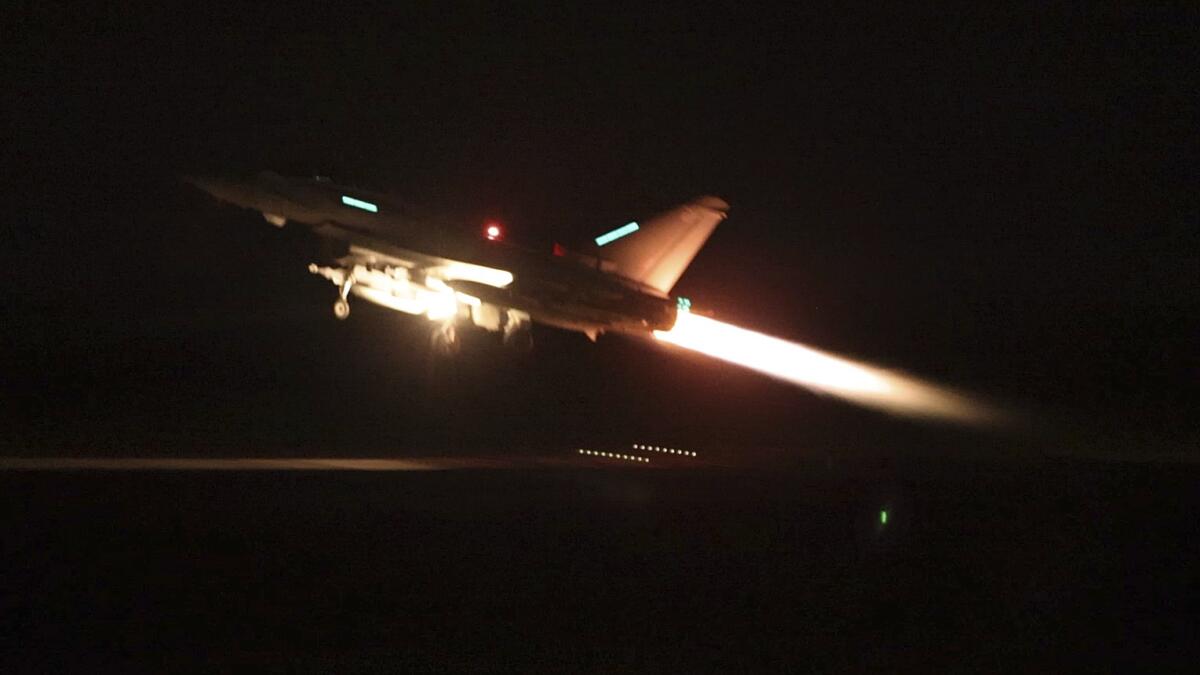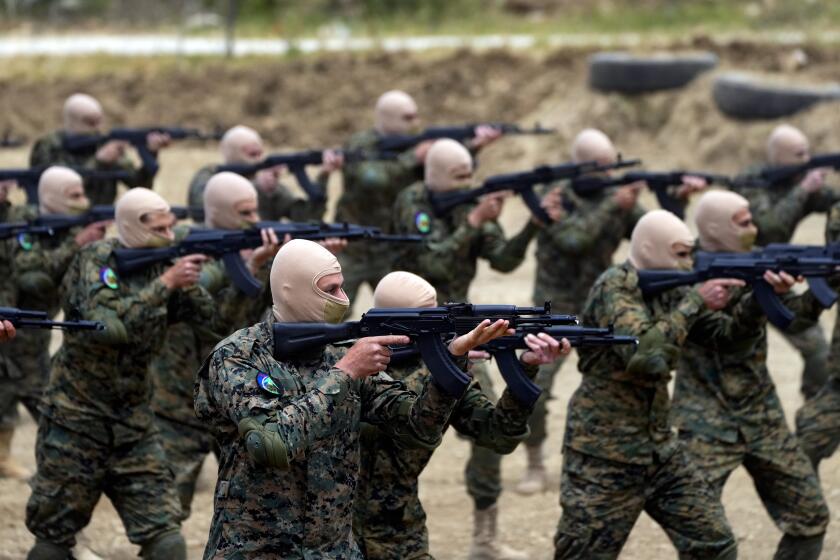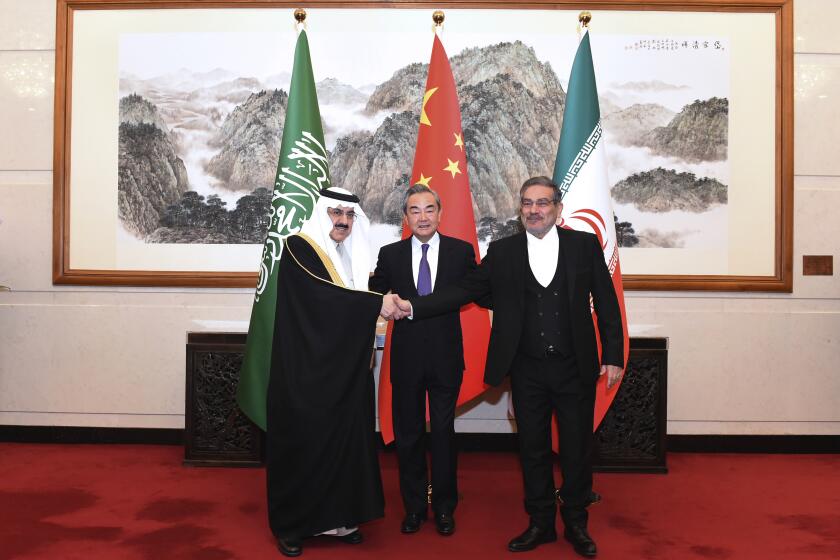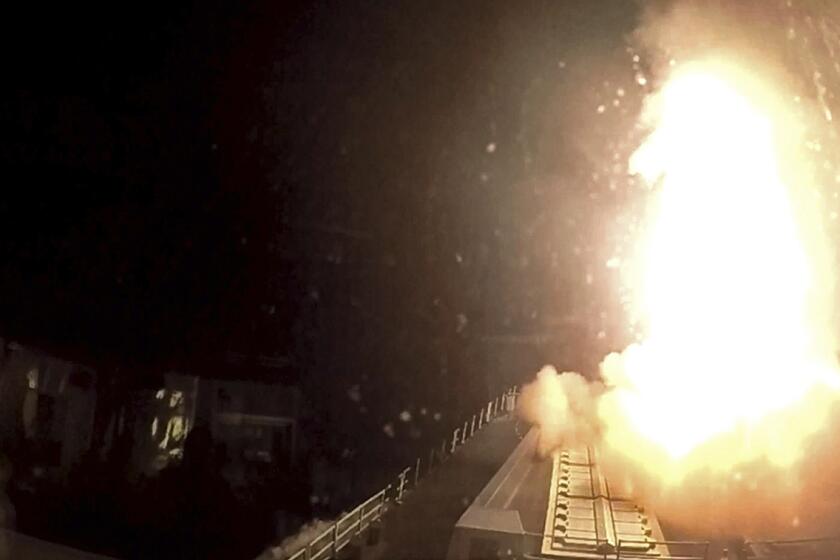U.S. warns ships to stay out of parts of Red Sea as Houthi rebels vow retaliation for U.S., U.K. strikes

- Share via
DUBAI — The U.S. Navy on Friday warned American-flagged vessels to stay out of areas around Yemen in the Red Sea and the Gulf of Aden for the next 72 hours after the U.S. and Britain launched multiple airstrikes targeting Houthi rebels.
The warning in a notice to shippers came as Yemen’s Houthis vowed fierce retaliation for the strikes, further raising the prospect of a wider conflict in a region already beset by Israel’s war in Gaza.
U.S. military and White House officials said they expected the Houthis to try to strike back. And President Biden warned on Friday that the group could face further strikes.
“Nobody was pollyannish about the possibility that they might conduct some sort of retaliation,” National Security Council spokesman John Kirby said. He added, “This wasn’t some signaling exercise. This was designed to disrupt and degrade Houthi military capabilities.”
The bombardment — launched in response to a recent campaign of drone and missile attacks on commercial ships in the vital Red Sea — killed at least five people and wounded six, the Houthis said. The U.S. said the strikes took aim at more than 60 targets in 28 different locations across Houthi-controlled areas of Yemen.
“We will make sure that we respond to the Houthis if they continue this outrageous behavior along with our allies,” Biden told reporters during a stop in Emmaus, Penn.
Asked if he believes the Houthis are a terrorist group, Biden responded, “I think they are.” The president in a later exchange with reporters during a stop in Allentown, Penn., said whether the Houthis are redesignated as such was “irrelevant.”
Biden also pushed back against some lawmakers, both Democrats and Republicans, who said he should have sought congressional authorization before carrying out the strikes.
“They’re wrong, and I sent up this morning when the strikes occurred exactly what happened,” Biden said.
The Pentagon said Defense Secretary Lloyd Austin ordered the military action from the hospital where he is recovering from complications following prostate cancer surgery.
The White House said in November that it was considering redesignating the Houthis as a terrorist organization after they began their targeting of civilian vessels. The administration formally delisted the Houthis as a “foreign terrorist organization” and “specially designated global terrorists” in 2021, undoing a move by President Trump
Lt. Gen. Douglas Sims, director for operations of the Joint Staff, said that the new U.S. strikes were largely in low-populated areas, and the number of those killed would not be high. He said the strikes hit weapons, radar and targeting sites, including in remote mountain areas.
As the bombing lit the predawn sky over multiple sites held by the Iranian-backed rebels, it forced the world to again focus on Yemen’s years-long war, which began when the Houthis seized the country’s capital.
Since November, the rebels have repeatedly targeted ships in the Red Sea, saying they were avenging Israel’s offensive in Gaza against Hamas. But they have frequently targeted vessels with tenuous or no clear links to Israel, imperiling shipping in a key route for global trade and energy shipments.
The Houthis’ military spokesman, Brig. Gen. Yahya Saree, said in a recorded address that the strikes would “not go unanswered or unpunished.”
Rep. Elissa Slotkin, a Michigan Democrat and former U.S. intelligence official, welcomed the U.S. strikes but expressed concern Iran was aiming to draw the U.S. deeper into conflict.
“We should be worried about regional escalation,” Slotkin wrote on X. “Iran uses groups like the Houthis to fight their battles, maintain plausible deniability and prevent a direct conflict with the U.S. or others. ... It needs to stop, and my hope is they’ve gotten the message.”
Biden told reporters that Iran has received a clear message. “I already delivered the message to Iran. They know not to do anything,” he said.
The British military’s United Kingdom Maritime Trade Operations, which oversees Mideast waters, reported on Friday evening a new missile attack off Yemen. It said the missile was fired toward a ship some 90 miles southeast of Aden, Yemen, while the ship was being followed by three small vessels. The shipmaster reported missiles landing in the water 400 to 500 meters away, but they caused no injures or damage, the organization said.
“Vessels are advised to transit with caution,” it warned.
Though the Biden administration and its allies have tried to calm tensions in the Middle East for weeks and prevent any wider conflict, the strikes threatened to ignite one.
Saudi Arabia — which supports the government in exile that the Houthis are fighting — quickly sought to distance itself from the attacks as it seeks to maintain a delicate détente with Iran and a cease-fire it has in Yemen.
War in the Mideast has sharply divided California voters along lines of age and ideology. President Biden is caught in the middle, opposed by both left and right for his response to the fighting.
It remained unclear how extensive the damage was, though the Houthis said at least five sites, including airfields, had been attacked. The White House said Friday the U.S. military was still assessing the extent the militants’ capabilities might have been degraded.
U.S. Air Forces Central Command said the strikes focused on the Houthis’ command-and-control nodes, munition depots, launching systems, production facilities and air-defense radar systems. The strikes involved more than 100 precision-guided munitions, including air-launched missiles and ship- and submarine-launched Tomahawk land attack missiles.
Britain said airstrikes hit a site in Bani allegedly used by the Houthis to launch drones and an airfield in Abbs used to launch cruise missiles and drones.
Meanwhile, the U.S. Treasury Department on Friday announced that it had imposed sanctions on two firms in Hong Kong and the United Arab Emirates for allegedly shipping Iranian commodities on behalf of Iran-based Houthi backer Said Jamal. Four vessels owned by the firms were also identified as blocked property.
Hussein Ezzi, a Houthi official in the rebel group’s Foreign Ministry, said that “America and Britain will undoubtedly have to prepare to pay a heavy price and bear all the dire consequences of this blatant aggression.”
Accused of committing genocide against Palestinians, Israel defended its war on Hamas in Gaza at the United Nations’ highest court at The Hague.
The Red Sea route is a crucial waterway, and attacks there have caused severe disruptions to global trade. Benchmark Brent crude oil traded up some 4% on Friday at more than $80 a barrel. Tesla, meanwhile, said it would temporarily halt most production at its German factory because of attacks in the Red Sea.
Meanwhile, the U.S. Navy acknowledged an attack days earlier on a ship in the far reaches of the Indian Ocean — an attack that may signal Iran’s willingness to strike vessels as part of a wider maritime campaign over the Israel-Hamas conflict.
Tehran on Thursday separately seized another tanker.
In Saada, the Houthis’ stronghold in northwest Yemen, hundreds gathered for a rally Friday, denouncing the U.S. and Israel. Another drew thousands in Sana, the capital.
Missiles, rockets and drones strike targets around the Middle East as the United States, Israel and others clashed with Iran-allied militant groups
Yemen has been targeted by U.S. military action over the last four American presidencies. A campaign of drone strikes began under President George W. Bush to target the local affiliate of Al Qaeda, attacks that have continued under the Biden administration. Meanwhile, the U.S. has launched raids and other military operations amid the ongoing war in Yemen.
That war began when the Houthis swept into Sana in 2014. A Saudi-led coalition including the United Arab Emirates launched a war to back Yemen’s exiled government in 2015, quickly morphing the conflict into a regional confrontation as Iran backed the Houthis with weapons and other support.
That war, however, has slowed as the Houthis maintain their grip on the territory they hold. In March, Saudi Arabia reached a Chinese-mediated deal to restart relations with Iran in hopes of ultimately withdrawing from the war.
However, an overall deal has yet to be reached, likely sparking Saudi Arabia’s expression Friday of “great concern” over the airstrikes.
The rapprochement between longtime rivals Saudi Arabia and Iran sent shock waves through the Middle East and dealt a symbolic blow to Israel’s leader.
“While the kingdom stresses the importance of preserving the security and stability of the Red Sea region ... it calls for restraint and avoiding escalation,” the Saudi Foreign Ministry said in a statement.
Iran condemned the attack in a statement by Foreign Ministry spokesman Nasser Kanaani.
“Arbitrary attacks will have no result other than fueling insecurity and instability in the region,” he said.
In Beijing, Chinese Foreign Ministry spokeswoman Mao Ning called on nations not to escalate tensions in the Red Sea. Russia condemned the strikes as “illegitimate from the point of view of international law.”
Yemen’s Houthi rebels have fired their largest barrage of drones and missiles on shipping in the Red Sea, prompting the U.S. and British navies to respond.
Oman, long a regional interlocutor for the U.S. and the West with Iran, condemned the airstrikes. It called the attack a “great concern while Israel continued its brutal war and siege of the Gaza Strip without accountability or punishment.”
Meanwhile, the U.S. Navy on Friday confirmed an attack days earlier near the coasts of India and Sri Lanka. The chemical tanker Pacific Gold was struck Jan. 4 by what the Navy called “an Iranian one-way attack” drone, causing some damage to the vessel but no injuries.
The Pacific Gold is managed by Singapore-based Eastern Pacific Shipping, a company that is controlled by Israeli billionaire Idan Ofer. Iran has not acknowledged carrying out the attack.
More to Read
Sign up for Essential California
The most important California stories and recommendations in your inbox every morning.
You may occasionally receive promotional content from the Los Angeles Times.














